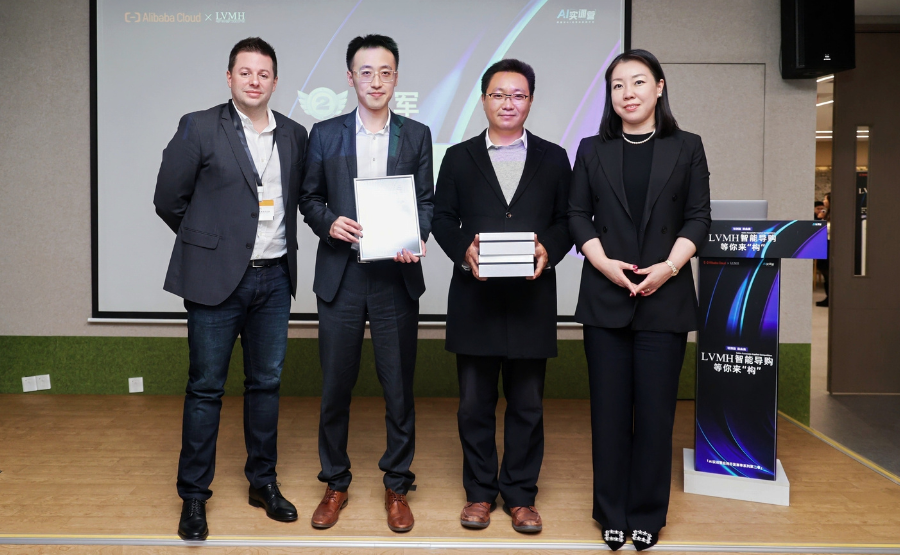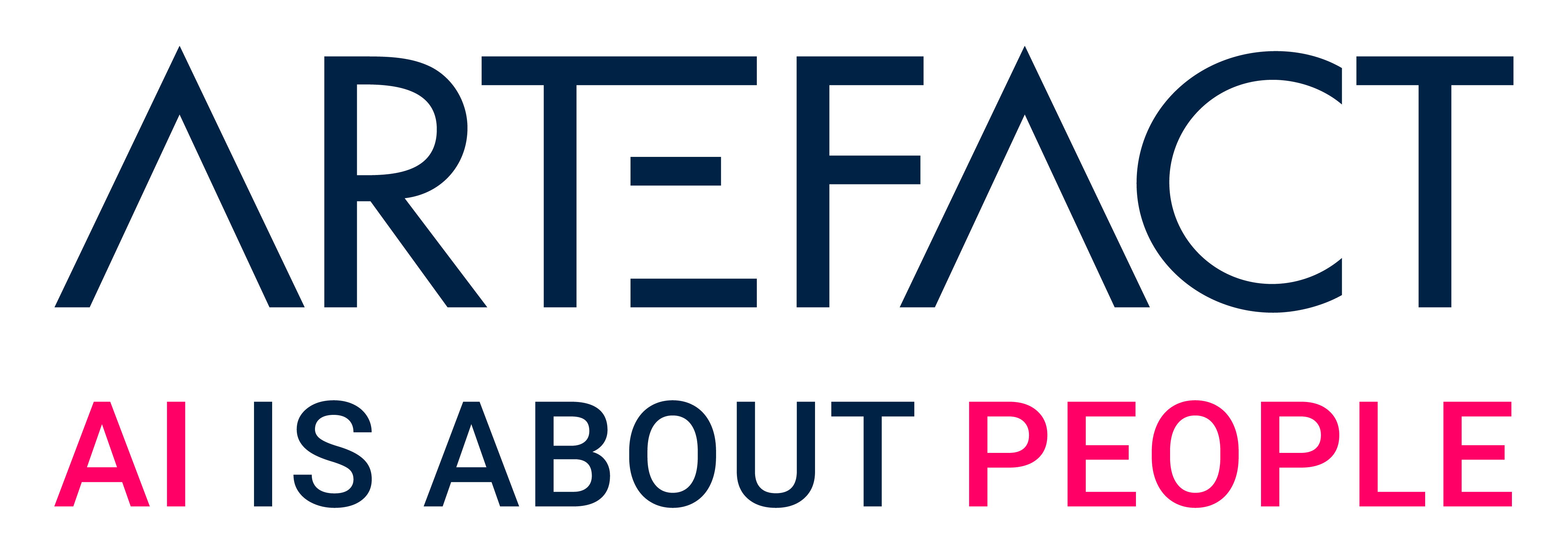In the recent LVMH × Alibaba Cloud AI Competition, Artefact showcased SAIA, an AI-powered sales assistant designed to seamlessly integrate into retail workflows. Built on a robust multi-layer AI architecture, SAIA enhances sales efficiency and customer engagement in luxury retail.
On March 13, 2025, the second LVMH × Alibaba Cloud AI Competition successfully concluded. This year’s competition was judged based on three core criteria: experience, insights, and efficiency. It emphasized the real-world commercial value of AI, driving the deep integration of AI technology in the luxury industry.
As a long-term digitalization partner of LVMH and a strategic partner of Alibaba Cloud, Artefact leveraged its extensive experience in the luxury sector and expertise in large language model (LLM) applications to develop the AI sales assistant SAIA (SA Intelligence Assistant). By creating a comprehensive smart agent solution covering the pre-sales, sales, and after-sales stages, Artefact enhanced luxury retail decision-making and service experiences, achieving a top ranking in the competition.
SAIA: Empowering the Full Luxury Retail Experience
Artefact believes that an intelligent agent must have three essential capabilities: insight, action, and embedded workflow integration. These ensure that AI can truly drive business decisions and improve sales efficiency. SAIA demonstrated this concept in the competition by seamlessly integrating with retail workflows—offering insights on products, providing intelligent training simulations, analyzing customer preferences, and generating personalized styling recommendations.
- Pre-Sales: Large-Scale Social Media Insights Powering Sales Training
New product launches for luxury brands are often influenced by social media trends. However, traditional data analysis processes typically take two to three weeks, causing delays in marketing strategies. SAIA leverages LLMs and multi-channel data analysis (including Xiaohongshu, Weibo, and Instagram) to conduct large-scale social media trend analysis rapidly, significantly improving product positioning accuracy.
This capability was validated in the launch strategy for the LV × Takashi Murakami collaboration. Compared to traditional data processing methods, SAIA increased efficiency by 80%.
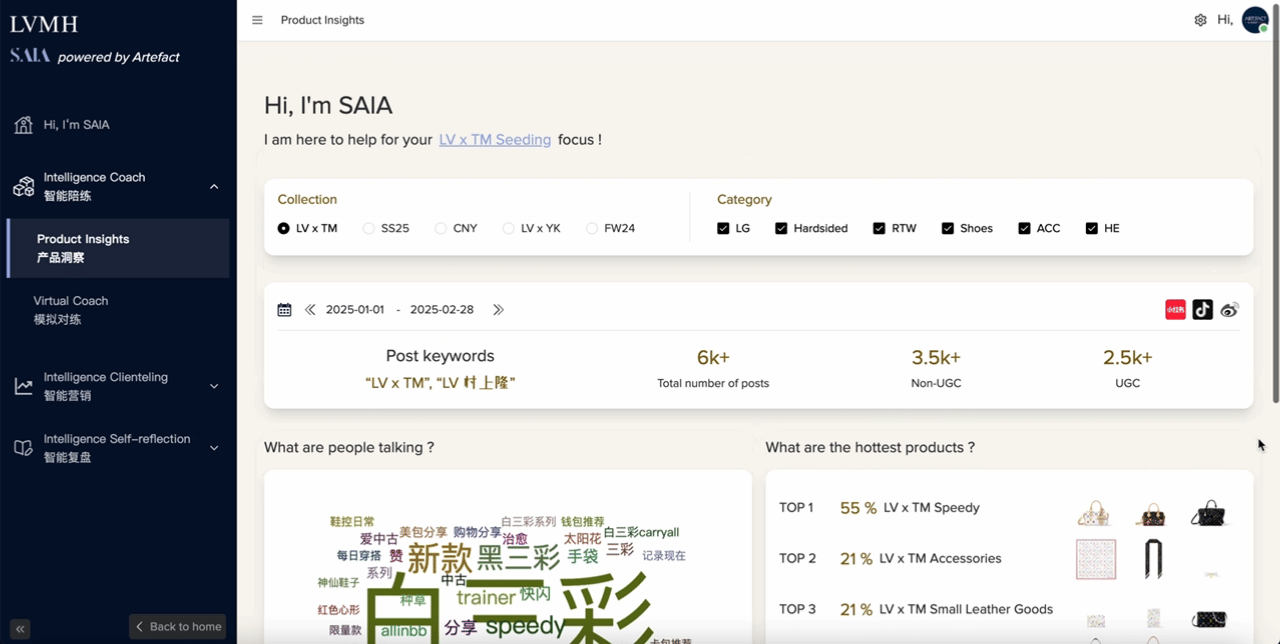
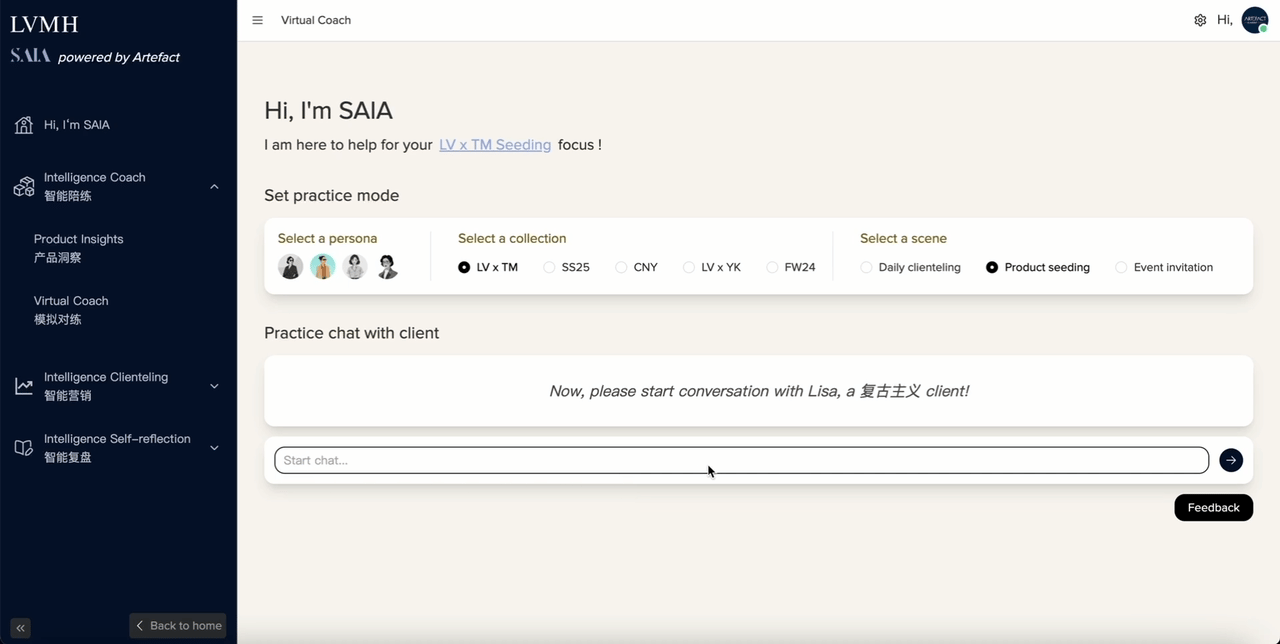
- Sales: Decoding Customer Preferences for Personalized Styling Suggestions
Luxury sales associates rely on experience to recommend products. SAIA enhances this process by analyzing purchase history, online browsing behavior, and social media interactions to generate personalized styling recommendations.
For example, the system can quickly identify a VIP client’s preference for minimalist fashion and suggest neutral-toned apparel along with matching shoes and accessories for a complete look. This AI-driven approach reduced styling recommendation response time from 90 seconds to 30 seconds, while improving product recommendation accuracy by 20%.
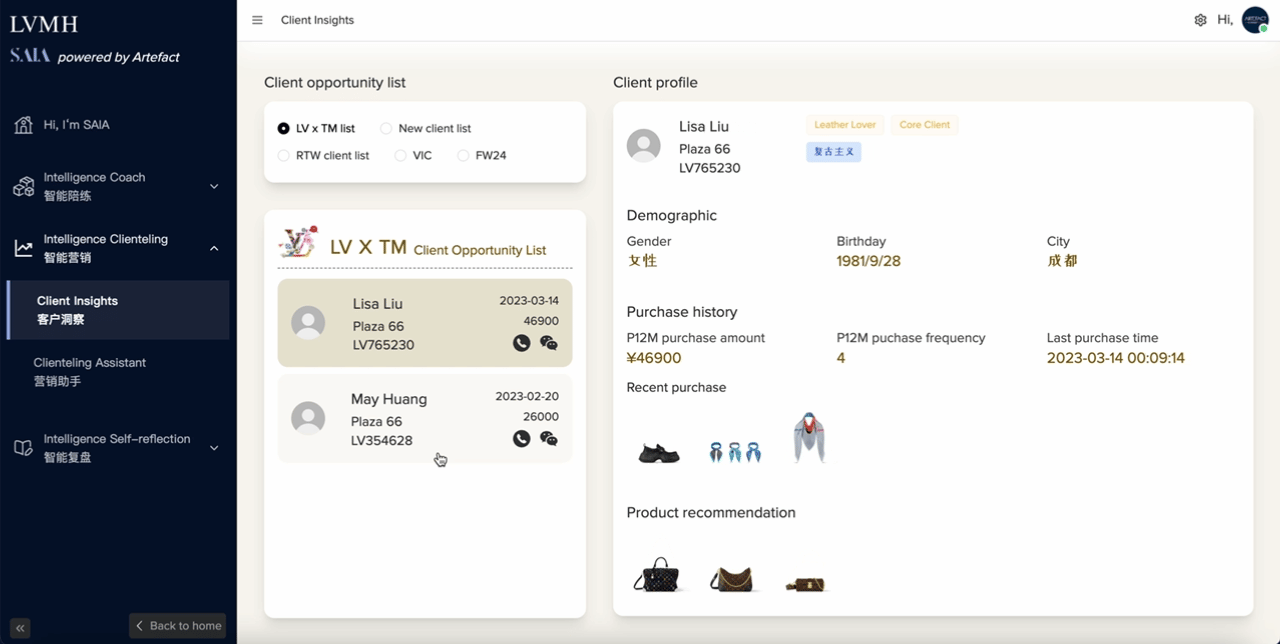
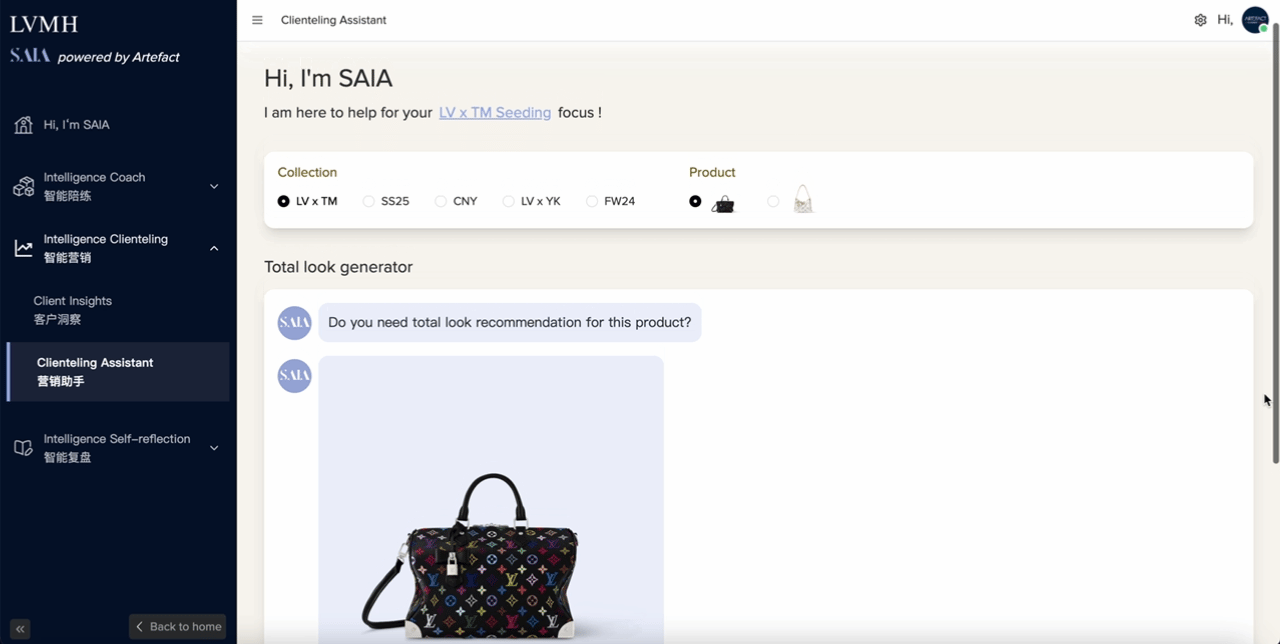
- Post-Sales: Intelligent Debriefing & Data-Driven Sales Optimization
Traditionally, sales associates manually review customer data to adjust their follow-up strategies, but incorrect assumptions or fragmented information often reduce effectiveness. SAIA utilizes LLMs to analyze sales data, automatically generate customer interaction summaries, and provide actionable marketing recommendations based on shopping behavior patterns. This significantly enhances customer relationship management efficiency.
–
Luxury retail is centered on personalized experiences rather than standardized transactions. As brands scale their operations, ensuring each customer receives a tailored service remains a challenge.
Artefact’s AI SA is designed to enhance, not replace human sales associates. By embedding AI-driven intelligence into retail workflows, SAIA enhances decision-making efficiency and refines luxury customer service—making it more precise and personalized.
Artefact’s Five-Layer AI Architecture for Enterprise-Scale Intelligent Agents.
The core advantage of SAIA goes beyond individual AI tasks—it lies in its ability to seamlessly integrate into the entire luxury retail workflow, truly enhancing operational efficiency.
To achieve this, Artefact developed a five-layer AI architecture, ensuring high data processing efficiency and business scalability:
- Data Layer: Integrates store, social media, and CRM data, breaking down data silos.
- Data Preprocessing Layer: Automates data labeling and optimization to improve model accuracy.
- Knowledge Layer: Builds brand-specific knowledge bases to ensure AI understands brand identity and customer preferences.
- Agent Workflow Layer: Manages and coordinates multiple AI agents, ensuring precise and efficient responses across retail applications.
- Application Layer: Integrates SAIA within existing CRM and store management systems for large-scale deployment.
During the competition, this architecture proved highly effective:
- The Data & Preprocessing Layers enhanced AI response speed by 60%.
- The Knowledge Layer enabled AI insights to be reused across multiple applications, shortening development timelines significantly.
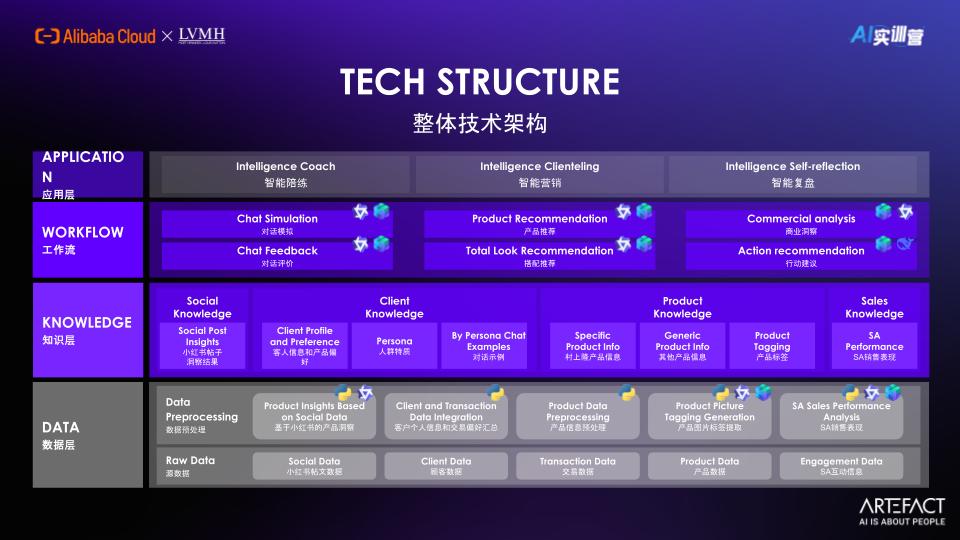
Artefact believes AI technology is shifting from a supporting tool to a core business driver. Moving forward, luxury brands must master three key capabilities to maintain a competitive edge:
- Scalable Personalization: Delivering tailored experiences at scale.
- Real-Time Trend Awareness: Rapidly adapting to market shifts.
- Data Management Compliance: Ensuring secure and responsible AI use.
This competition reinforced Artefact’s position as a leader in AI-driven luxury retail innovation.
Recently, Artefact joined Alibaba Cloud’s “Tongyi Qianwen Partnership Program” as a Tongyi Qianwen (Qwen) ecosystem partner. Over the past six months, Artefact has processed 16.7 billion tokens through Alibaba Cloud’s LLMs across various AI initiatives, including marketing, customer service, and automated content generation.
Moving forward, Artefact and Alibaba Cloud will deepen their collaboration to accelerate AI adoption across industries.

 BLOG
BLOG